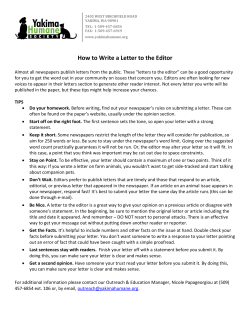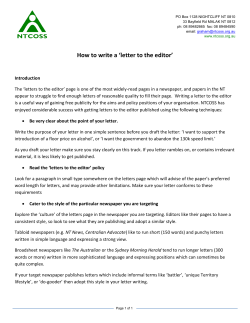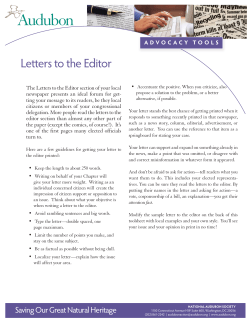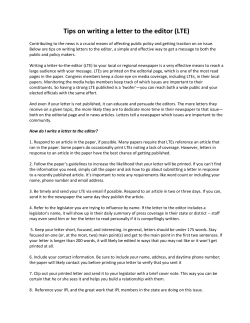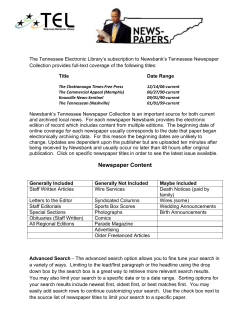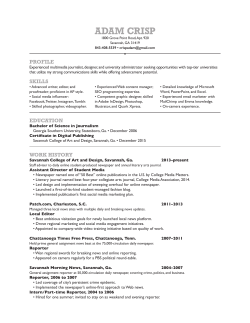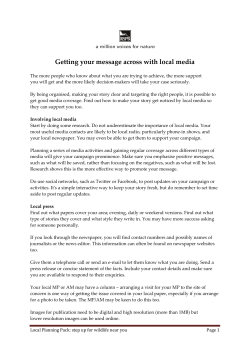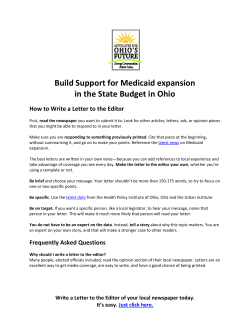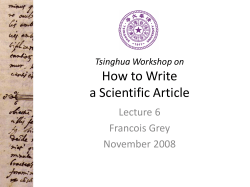
Letter to the Editor
Letter to the Editor Note: This document should only be used as a reference and should not replace assignment guidelines. Letters to the editor are published in most newspapers. A letter to the editor is a brief letter, usually between 150-300 words long, expressing an opinion on a single topic. Why write a letter to the editor? When you write a letter to the editor, you impact your community. You can share your opinion, highlight a problem, raise a concern, or praise a success. For example, you could share your views about an issue in an upcoming election, raise awareness for a charitable cause, or praise an outstanding local event. The “Letters to the Editor” section in newspapers is one of the most widely read, and so getting a letter published there is a great way to make your voice heard. Preparation & Prewriting Choose your topic. Because letters to the editor are so short, it is best to choose a single topic so that you have space to explain your view. You can comment on a recent article in the newspaper you are writing to, write about a current event, or raise awareness for something you think people should know about in your community. If you are responding to a previous letter or article, mention it by name at the beginning of your letter. Choose your publication. Each newspaper will have slightly different criteria for its letters to the editor, so you should choose the newspaper you want to write to before you begin writing. Pick the newspaper that will best help you reach the community you want to talk to. It is typically easier to get published in smaller newspapers, since they tend to receive fewer submissions. Check out your newspaper of choice. Go to the website of the newspaper you’ve selected and find its page with information on how to submit a letter to the editor. This page will let you know the maximum number of words you can submit in a letter and any other criteria you need to know. This page will also show you how and where to submit your letter. You may want to read some of the letters to the editor the newspaper has published previously to help you learn about what the paper publishes and to give you some examples for how you can write your own letter. Brainstorm and organize. Write out all of the things you want to say. Which is the most important? Are there any facts you can include? Start to organize your ideas, remembering that you have a limited amount of space to share your message. UVU Writing Center • Library 208 • ph: 801-863-8936 • Updated 2012 Web: www.uvu.edu/owl • Facebook: UVUWritingCenter • Twitter: @uvuwritingctr Letter to the Editor Note: This document should only be used as a reference and should not replace assignment guidelines. Writing & Style Get to the point. When you start writing, make sure to grab your readers’ attention and let them know in the first sentence what you are talking about. Newspaper editors may need to cut down your letter to fit it in the paper, and they will usually cut from the bottom up. Therefore, make sure your most important information is near the top. State your opinion. Include facts and statistics if necessary, making sure to mention where you got them. Keep it brief. Then leave your readers with a powerful concluding statement that will help them remember what you’ve said. Be credible. Keep your language clean, respectful, and intelligent. People are more likely to respect and listen to your opinion if they feel you know what you are talking about and have respect for others. Revise & Submit Revise and edit. Part of sounding credible is cleaning up your writing, spelling, and grammar. Read your letter aloud— this will help you catch many errors—and have someone you trust read over your letter too. Does it say what you want to say? Could you make your message clearer? Submit your letter. Submit your letter to the editor as described by your newspaper of choice. Typically, it is better to email letters than mail them. Many newspapers have an online form to complete before submitting your letter where you will need to enter your phone number and other personal information. If your letter is chosen for publication, you will probably get a phone call to verify that you are the author. If you are writing in response to another article or a current event, submit your letter as soon as possible so that it will be relevant. Resources Used & Helpful Websites The Community Toolbox (more information and tips for writing letters to the editor), http://ctb.ku.edu/en/tablecontents/sub_section_main_1239.aspx UVU Online Writing Lab (provides handouts to help with grammar, composition, and writing needs), uvu.edu/owl Sierra Club Writing Tips (tips for improving your letters to the editor), http://www.sierraclub.org/takeaction/toolkit/letters.asp UVU Writing Center • Library 208 • ph: 801-863-8936 • Updated 2012 Web: www.uvu.edu/owl • Facebook: UVUWritingCenter • Twitter: @uvuwritingctr
© Copyright 2025
